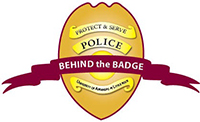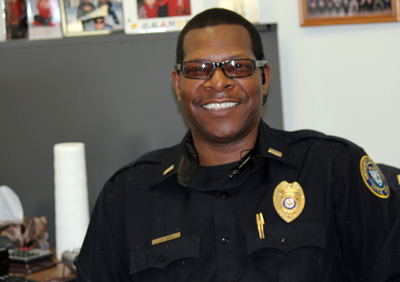Behind the Badge: Lt. Johnny Smith talks trust
NOTE: This is the fifth in a series profiling officers with the University of Arkansas at Little Rock’s Department of Public Safety.
Shortly after the UALR Department of Public Safety reintroduced bicycle patrols in the 2013 fall semester, Lt. Johnny Smith, along with his bike, became a visible presence on and around campus.
 Years ago, Smith trained with the International Bicycle Association. Due to this expertise, he was charged with leading the first four officers involved in the bicycle patrol when it was re-established after being dormant for some time.
Years ago, Smith trained with the International Bicycle Association. Due to this expertise, he was charged with leading the first four officers involved in the bicycle patrol when it was re-established after being dormant for some time.
Because of his visibility, Smith also became a frequent interview subject for reporters who told the story of the new patrol through their media channels.
As Smith explained to reporters, the bicycle patrol is one way the Department of Public Safety maintains a good rapport with the campus family it serves.

Creating a family-like atmosphere is a leadership style that has served Smith well in the nearly 20-year career he has enjoyed at UALR. He has risen through the ranks from officer to corporal, then sergeant, and finally lieutenant.
“Most great leaders create an environment where the people they lead are like family,” Smith said. “When people are treated like family, they learn to trust you. If they trust you, they will follow you.”
But if Smith had his way coming out of Mills High School in 1983, he would have followed a different path by landing a track and field scholarship to a college somewhere outside of Arkansas.
According to Smith, in the early 1980s, his high school track meets were thick with recruiters, but an unexpected and severe injury to his groin area during one meet thwarted any plans he had for an athletic scholarship.
“The recruiters disappeared,” he said. “It broke my heart.”
Smith traveled to the home of an aunt in Colorado to continue healing from his injury. He enrolled in a nearby trade school where he honed his skills in heating, ventilation, and air conditioning maintenance.
“I was pretty good at it, too,” Smith said. “I was earning $500 a week back then. For an 18 or 19-year-old at that time, it seemed like a lot of money.”
So how did he end up in law enforcement back home in Arkansas?
“My cousin tricked me,” Smith joked. “He said there would always be a need for law enforcement and that I ought to come back to Arkansas and apply at the Little Rock Police Department with him.”
Of the two, Smith became the one who ultimately completed the eight weeks at the Arkansas Law Enforcement Training Academy. Afterward he was hired by a colleague who was chief of police in Wrightsville.
“And I haven’t looked back,” Smith said with a broad smile on his face.
In 1994, Smith was recruited by one of the founders of the Criminal Justice Institute to work at UALR. The CJI was established in 1988 to enhance the proficiency of Arkansas law enforcement professionals.
“I didn’t even realize at the time that UALR had a Department of Public Safety,” Smith said with a laugh.
He added, “I am always amazed at those who still don’t realize we exist or what services we provide. We are working hard to turn things around, so people know who we are. The bike patrol is part of that effort. We want people to know we are here for them.”
Smith also said that statistically speaking, the campus is one of the safest in the state. And courses such as active shooter training make UALR officers among the most highly trained in the area.
UALR police officers will go to extreme measures to put the safety of students and employees first – even above their own safety, according to Smith.
“In the same way that a firefighter wouldn’t leave a baby behind if it were left in a burning building, it’s the same way with us in law enforcement,” Smith said. “It’s what we were trained to do.”
Interest in a career in criminal justice? Find out more at ualr.edu/criminaljustice.
Read more articles in the Behind the Badge series.